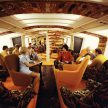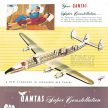easyJet has just published an incredible travel report from Europe’s leading futurists and experts from the worlds of aerospace, innovation and engineering looking at how we will travel in 50 years.
JOIN: AirlineRatings.com YouTube Channel
GET: Accurate MH370 Information From AirlineRatings.com Newsletter
SEE: GT’s Radar Slams Netflix MH370 Doco
easyJet 2070: The Future Travel Report is co-authored by Professor Birgitte Andersen, Professor Graham Braithwaite, Dr Patrick Dixon, Nikhil Sachdeva, futurist Shivvy Jervis and design scientist Dr Melissa Sterry.
Biomimetic sensory plane seats, optoelectronic inflight entertainment beamed directly to passengers’ eyes and digital personal holiday concierges will be the norm by 2070.
Three quarters (75%) of Brits say that these technological advances would make them more likely to go on holiday in the future, with heartbeat passports, time travelling holiday experiences, and 3D printed hotel buffet food among the expert predictions that Brits would most like to see become reality.
The ground-breaking report, commissioned by airline easyJet, forecasts innovations in airport journeys, air travel, accommodation, and holiday experiences.
The easyJet 2070: The Future Travel Report was authored by a group of leading academics and futurists, including Professor Birgitte Andersen of Birkbeck, University of London and CEO of Big Innovation Centre; Dr Melissa Sterry, design scientist and complex systems theorist; and renowned futurists Shivvy Jervis and Dr Patrick Dixon, as well as Director of Transport Systems at Cranfield University, Professor Graham Braithwaite and Nikhil Sachdeva, Principal for aerospace and defence and sustainable aviation at consultancy Roland Berger.
easyJet 2070: The Future Travel Report highlights include:
- Heartbeat and biometric passports will replace the traditional passport, for passengers to breeze through their airport. Much like fingerprints and the retina, every person’s cardiac signature is unique. Passengers’ heartbeat signatures and biometric details will be logged on a global system in the same way fingerprint scanning technology works today.
- Ergonomic and biomimetic sensory plane seats will become the norm, with smart materials adapting to passengers’ body shape, height, weight, and temperature, providing the ultimate tailored comfort flying experience
- Inflight entertainment will be beamed directly in front of passenger’s eyes, via optoelectronic devices, replacing the need for onboard screens or downloading movies before you fly
- e-VTOL air taxis will do away with the airport car park shuttle – the journey to the airport will be quicker and more convenient than ever before with 85% of passengers arriving by e-VTOLs from their homes to the terminal.

Three-quarters (75%) of Brits say that these technological advances would make them more likely to go on holiday in the future.
Speaking about the report, easyJet CEO Johan Lundgren said:
“Innovation is in our DNA and we’re always challenging ourselves to think big and look at how we can make travel even easier for people all across Europe, both today and for generations to come. From biometric heartbeat passports to time-travelling holiday experiences, travel in 2070 is likely to be very different and exciting indeed.”
Heading up the report, Professor Birgitte Andersen of Birkbeck College, said:
“This next 50 years will bring the largest technological advances we have ever seen in travel and tourism. Aspects of how we holiday will be transformed beyond recognition; in the future holidaymakers will be queuing at the hotel buffet to have their breakfast omelettes and fry-ups 3D printed by machines, our heartbeat will become our passport, and in-ear devices will translate the local language in real time and enable us to speak the local lingo. Looking forward, by the year 2070 the destinations we fly to, the type of accommodation we stay in, and the experiences we have, will have changed immeasurably.”
























